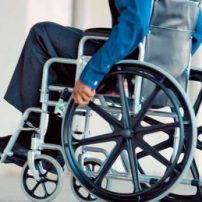
Different disabilities benefits to paraplegic citizens and war veterans. Logical and reasoned distinction of benefits. Non-violation of the ECHR
JUDGMENT
Popović and others v. Serbia 30.6.2020 (no. 26944/13, 14616/16, 14619/16 and 22233/16)
SUMMARY
The case concerned the applicants’ complaint that the domestic legislation on disability benefits for
paraplegics was discriminatory. They alleged in particular that paraplegic civilians such as themselves
were awarded fewer benefits than war veterans with the same disability.
The Court found in particular that the choice made by the Serbian legislator to vary the provision of
benefits for paraplegics, depending on whether they were civilians or war veterans, had not been
without reasonable foundation. That choice had been based on relevant and sufficient grounds,
namely the distinct ways in which the two groups had sustained their injuries. Disabled war veterans
were injured in the line of duty, involving greater risk and more difficulties to obtain redress, while
disabled civilians, such as the applicants, had been injured in accidents and had access to other
benefits not necessarily available to all war veterans
PROVISIONS
Article 14
Article 1 of the First Additional Protocol
PRINCIPAL FACTS
The applicants, Dejan Popović, Josip Vlček, Miroslav Homa, and Zvonko Nikolić are Serbian nationals
who was born respectively in 1983, 1947, 1959 and 1977. They live in Novi Sad (Serbia). They are all
paraplegics and are reliant on wheelchairs.
The applicants became paraplegic after sustaining injuries following an accident. Mr Popović
sustained his injury after a five-metre fall. Mr Vlček and Mr Homa were involved in traffic accidents
and Mr Nikolić in a shooting incident. They were diagnosed as being 100% disabled and were
granted benefits, in particular an allowance to receive assistance from another person.
They all brought civil discrimination claims against the Ministry of Labour, Employment and Social
Policy, to complain that paraplegic civilians such as themselves were awarded fewer benefits than
war veterans with the same disability. Mr Popović brought his claim in 2008, while the other
applicants brought their claims in 2007.
Their claims were ultimately unsuccessful, the courts essentially finding that granting different
benefits to different categories of disabled persons did not amount to discrimination, particularly
given a State’s discretion to decide on matters involving social policy.
THE DECISION OF THE COURT…
The Court would normally examine whether the applicants, as disabled civilians, were in “analogous
or relevantly similar situations” to disabled war veterans. However, in the context of the case, it
found that it was not necessary because, in any event, the difference in treatment between the two
groups had had an objective and reasonable justification.
First, it accepted the Government’s justification for the difference in treatment by the distinct ways
in which the two groups had sustained their injuries. On the one hand, the first group, comprised of
war veterans, had suffered injuries during their military service which, because of the higher level of
risk involved in their duties, were difficult to insure and obtain redress for. The second group
including the applicants, on the other hand, had been injured during accidents or illnesses.
The variation in the provision of benefits had therefore been the consequence of the groups’ distinct
positions. Indeed, while a State might feel obliged to honour a moral debt to war veterans for their
service, disabled civilians lacking means in Serbia could be entitled to a number of benefits to which
certain war veterans might not.
Moreover, the national authorities were in principle better placed to appreciate what was in the
public interest. The Court would therefore generally respect the legislature’s policy choice unless it
was “manifestly without reasonable foundation”. In the applicants’ case, the Court found that the
choices made by the Serbian legislator had not been without such reasonable foundation, and had
been based on relevant and sufficient grounds.
There had accordingly been no violation of Article 14, read in conjunction with Article 1 of Protocol
No. 1.
Separate opinions
Judges Ravarani and Schukking expressed a joint concurring opinion, while Judge Vehabović
expressed a dissenting opinion and was joined by Judge Paczolay.


